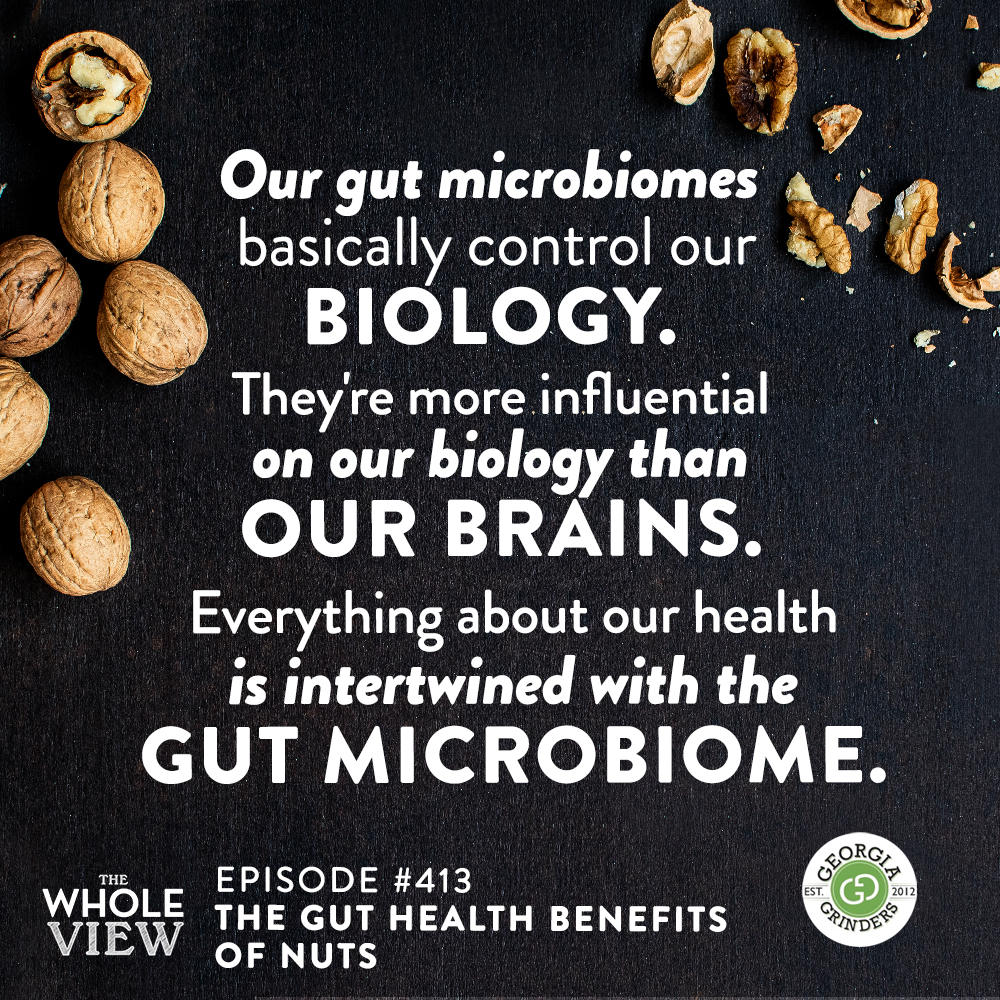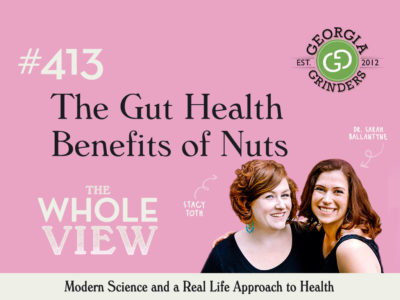Welcome to episode 413 of The Whole View. On this week’s episode, we talk about the benefits of eating nuts on the gut microbiome. Who knew that tree nuts had so many benefits?! All of this and more in episode 413!
If you enjoy the show, please review it on iTunes!
The Whole View, Episode 413: The Gut Health Benefits of Nuts
Welcome back to the Whole View, episode 413. (0:27)
Stay tuned to the end to see Stacy’s embarrassing blooper!
When Stacy started Paleo 10 years ago, nuts were extremely popular, and then the “paleo police” got ahold of them and they became demonized for their caloric density and use in dreaded baked goods.
But while moderating nuts is probably a good idea, they definitely do have their benefits! Brazil nuts have a huge amount of selenium for example.
Today’s sponsor is Georgia Grinders nut butters! Go to http://www.georgiagrinders.com/thewholeview/ and enter THEWHOLEVIEW for 25% off!
Sarah found these nuts at her local farmers market way back 7 years ago when they only made almond butter. Now they’re launching nationwide in Krogers!
Now they do all kinds of nut butters! No added oils or sugars and own and operate their own manufacturing facility
We love the Pecan, Hazelnut and Cashew butters as well!
What’s Good About Nuts?
Sarah has found nut research fascinating and surprising as the health community vacillates between love and hate (9:02)
Peanuts account for 2/3 of American nut consumption despite actually being a legume (it grows underground, not on trees!)
Save 70% Off the AIP Lecture Series!
Learn everything you need to know about the Autoimmune Protocol to regain your health!
I am loving this AIP course and all the information I am receiving. The amount of work you have put into this is amazing and greatly, GREATLY, appreciated. Thank you so much. Taking this course gives me the knowledge I need to understand why my body is doing what it is doing and reinforces my determination to continue along this dietary path to heal it. Invaluable!
Carmen Maier

Peanuts have challenges: they’re very pesticide heavy and are susceptible to mold. Most scientific studies can’t separate out quality. Are the problems with peanuts problems with peanuts or quality? Is it the HFCS or hydrogenated oils perhaps?
A mere 20 grams of tree nuts per day is associated with substantially reduced risk (think 20-70%) of cardiovascular disease, cancer, neurodegenerative disease, kidney disease, diabetes, infections, and mortality from respiratory disease.
High fat plant based foods: nuts and seeds, olives and avocados. That’s it! Nuts are unique because they have a lot of mineral content. High in polyphenol and phytosterol which lower cholesterol. High in Vitamin E and B vitamins as well.
Unique fiber types and fats that are good for gut microbiome. High in L-Argenine and L-Glutamine, which are essential amino acid they need to consume as well. These amino acids alone change the gut microbiome composition.
These properties alone might account for why nuts have all these health benefits.
Numerous studies show that people who regularly eat nuts tend to have more favorable blood lipid profiles, and one meta-analysis of 25 clinical studies showed that nut consumption had a dose-response cholesterol-lowering effect.
Interventional studies consistently show that increasing nut intake has a cholesterol-lowering effect, even in the context of healthy diets.
Plenty of research suggests that, despite their energy density, nuts and seeds don’t contribute to weight gain, and they may even protect against obesity and diabetes. This is probably because of their gut microbiome effects.
“Our gut microbiomes basically control our biology. They’re more influential on our biology than our brains. Everything about our health is intertwined with the gut microbiome.”
Read Sarah’s Ebook, The Gut Health Guidebook!
Different nuts have different Omega-3 to Omega-6 ratios, which is tied to cholesterol and cardiovascular health. But the heart benefits of nuts aren’t tied to the ones best for that ratio. If that was the mechanism, than no nut should have that benefit because none had the most beneficial Omega-3s like seafood has. Most likely they are heart healthy because of monounsaturated fat.
Nuts and seeds are an early reintroduction on AIP because their benefits far outweigh the reasons you would cut them out (essentially only because they have a high instance of intolerance).
Stacy found that dose was important with her reaction to nuts and that quality was important. Don’t oxidize your nuts by having them sit for months or buying cheap low quality nuts.
Benefits of Walnuts
Let’s talk about the benefits of individual nuts that have been studied (29:44)
Sarah is most interested in the mechanisms of provoking health, they “why?” of it. And she keeps seeing it linked back to gut microbiome benefits.
Best studied nuts are walnuts, almonds and pistachios.
In one randomized, controlled human trial, almost 200 healthy adults were given either eight weeks of a walnut-enriched diet (43 g of walnut per day) followed by a nut free diet, or the same two diets in reversed order. The study found that walnuts significantly increased the abundance of Ruminococcaceae and Bifidobacteria, while opportunistic Clostridium sp. cluster XIVa species species significantly decreased. Overall, walnut consumption appeared to give a major boost to probiotic and butyric acid-producing species in the human gut.
Another study tested the effects of eating either 42 g of walnuts or 0 g of walnuts daily for three weeks, and found that walnut consumption resulted in a 49-160% increase in the relative abundance of Faecalibacterium, Clostridium, Dialister, and Roseburia, while also causing a 16-38% lower relative abundance of Ruminococcus, Dorea, Oscillospira, and Bifidobacterium.
Likewise, compared to the walnut-free diet, the walnut diet reduced the microbially derived, proinflammatory secondary bile acids deoxycholic acid and lithocholic acid by 25% and 45% respectively, coinciding with a reduction in LDL cholesterol. The researchers concluded that the gut microbiota may play a direct role in some of the health benefits associated with walnuts!
In rats, a similar study feeding walnuts versus a macronutrient-matched walnut replacement (corn oil, casein, and cellulose fiber) found that walnuts enriched the microbiota with probiotic bacteria including Lactobacillus, Ruminococcaceae, and Roseburia, while also significantly reducing Bacteroides and Anaerotruncus.
Benefits of Almonds
Because almonds are one of the highest Omega-6 nuts, they’re often considered “the worst nut” but in terms of the gut microbiome, they’re fantastic! (38:43)
They’ve compared defatted almonds and skinned almonds, but really the benefit seems to be from the fiber improving species diversity. The more species you have, the more cooperation between species. For example, creating B12 has 30 different processes and it takes many bacteria cooperating to form B12 in the gut. And more species mean less opportunity for the opportunistic bacteria to take over.
A study of college freshmen found that eight weeks of almond snacking (vs. graham crackers) (56.7 g per day of almonds) led to a significant increase in microbiota α-diversity and a 48% decrease in the abundance of the pathogen Bacteroides fragilis.
In another study, 48 adults were fed a daily dose of 56 g of roasted almonds, 10 g of almond skins, or 8 g of just the fiber as a control. After six weeks, fecal levels of bifidobacteria and lactobacilli were significantly higher from consumption of both the almonds and almond skin, while levels of Clostridum perfringens significantly decreased—suggesting components of the almond skins (present both in whole almonds and the skin only) were responsible for these prebiotic effects.
Stacy heard someone redefining how you should think of macronutrients as protein fat and fiber instead of protein fat and carbohydrates, because it’s the fiber that will be the health benefits.
Sarah agrees the fiber targets are a good idea because fiber is often neglected and is very important. Fiber is carbs we can’t digest but our microbiome can! And small changes to fiber molecules mean that some species can break it down and some can’t. So variety in fibers is important for species diversity!
The Benefits of Pistachios
Pistachios are different from other tree nuts. They’re in the cashew family (same as poison ivy and mango, actually!) (50:18)
They definitely contribute to diversity of gut microbiome species like other nuts.
Uniquely, they also reduced the levels of trimethylamine N-oxide (TMAO) measured in the urine. TMAO is the byproduct that is the link between red meat and cardiovascular disease. (though it is unknown whether it’s a gut microbiome issue that produces it or if the TMAO causes the bad microbiome).
Other Nut Benefits
Sarah is going to hit you with her fun facts! (53:19)
Every nut and seed that has been evaluated in terms of its impact on the microbiome shows unique benefits. That means variety is best!
Hazelnuts and pecans have the highest proanthocyanidin (an awesome class of polyphenols) content
Highest contents of ellagic acid (walnuts and pecans) also presented the highest total phenol contents
Macadamias and cashews are the highest in monounsaturated fats (also good for microbiome, and heart-healthy)
Brazil nuts are super high in selenium, like 1 has 175% of the RDI! And an ounce has 1000% of the RDI! Selenium is important for immune and brain function. And it’s why you go crazy from mercury because it permanently binds with selenium. Hatters should have been pounding brazil nuts!
And Ounce per Day!
An ounce of nuts per day is the best idea. No further benefits after about an ounce. (58:26)
Moderation is a “dirty word” in health communities because people use it to rationalize less than ideal choices. But in terms of nuts, this actually is the best option.
Going beyond that can increase risk of stroke. So don’t go nuts on nuts!
Stacy thinks of it in terms of how our ancestors would have eaten them. They’re time consuming to get out of the shell and last longer than fruits and vegetables, so moderation seems like what would have been our relationship to them.
While there are some primates that do eat nuts as a primary food source. Sarah is curious how these species have adapted to high nut lifestyles.
Closing Thoughts
A huge thank you to Sarah for pulling all of the science together. (1:04:12)
Send us more questions through the contact form on the website.
Thanks for listening
Thanks to Georgia Grinder and their nut butters (Peanut, Almond, Hazelnut, Pecan and Cashew)! Go to http://www.georgiagrinders.com/thewholeview/ and enter THEWHOLEVIEW for 25% off! Handcrafted in small batches in their own facilities, no added sugars or oils or other problem ingredients. Just top quality nuts!
We will be back again next week.
Thank you again for listening. (1:07:05)










